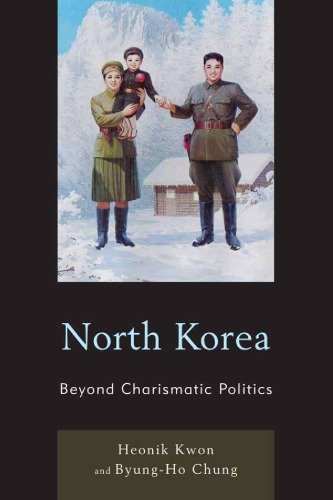
North Korea
Beyond Charismatic Politics
کتاب های مرتبط
- اطلاعات
- نقد و بررسی
- دیدگاه کاربران
نقد و بررسی

February 27, 2012
At the dawn of Kim Jong-Un's reign, professors Kwon (University of Cambridge) and Chung (Hanyang University, South Korea) deliver a penetrating (and endnote laden) argument for how North Korea remains adamantly isolated and surprisingly stable. Beginning their analysis in 1994 with the Great National Bereavement triggered by the death of Kim Il Sung, the authors backtrack to evaluate the means by which the Great Leader created the personality cult that has persisted through the reign of his late son, Kim Jong Il, and grandson, Kim Jong Un. Massive parades displaying military might, frequent publicity trips made by the successive leaders throughout the country, and enormous (and numerous) public artworks depicting the lineage ensured "a transition of power based on hereditary charisma" and sÅn'gun, North Korea's governing political and social ideology that prioritizes the military before all other segments of society. While the book was completed before Kim Jong Un's formal ascension in December 2011, Kwon (The Other Cold War) and Chung offer valuable insights into the evolution of a philosophy and nation determined to look inward and carry on in the 21st century as a neo-Confucian state built on the concepts of loyalty to a perceived sovereign (ch'ung) and filial piety (hyo). Given the message broadcast to spectators and the rest of the world at a recent festivalâ"Do not hope for any change in me!"âNorth Korea seems poised to stay the course whatever the costs. Illus.

February 15, 2012
Kwon (professorial senior research fellow, Trinity Coll., Univ. of Cambridge, UK; Ghosts of War in Vietnam), a social anthropologist, and Chung (cultural anthropology, Hanyang Univ., South Korea) undertake a carefully constructed study of the evolution of North Korea since Kim Il Sung's rise to power. What is now distinct about the North Korean state that the "Great Leader" founded is not its dictatorship, the power of the military, or the political system set in place. Rather, it's that North Korea is the only nation-state with a "charismatic revolutionary leader" at its apex that not only survived the Cold War but created a dynasty, now passed to the third generation, unlike its Soviet and Chinese counterparts. With many references to Clifford Geertz's studies of symbolic anthropology, the authors explore how North Korea succeeded--in this respect--where other postcolonial dictatorships have failed. They find an intensifying use of symbols, especially expressed in art and architecture, a kind of "theater state" that has risen to counter the absence of the apparent genuine heroism and charisma present at North Korea's founding. VERDICT A clearly written but decidedly academic text that should be of interest to all serious North Korea watchers.--Margaret Heilbrun, Library Journal
Copyright 2012 Library Journal, LLC Used with permission.

March 1, 2012
It is customary to refer to North Korea as the hermit kingdom and then recount various Orwellian horrors in what is undeniably an uber-totalitarian state. Yet, as this original, engrossing, but deeply unsettling study illustrates, North Korea, in a very perverse sense, works. That is, beginning with the founding of the North Korean state by Kim Il Sung, the regime has maintained itself and managed dynastic succession, avoiding the internal turmoil and violence that have occurred in other Communist states. Of course, the regime has survived with the use of massive political repression and control. But Kwon and Chung assert that the success of the regime is due to more than the usual totalitarian thuggery. The successor of Kim Il Sung, his son Kim Jong Il, created a theatre state, using a skillful manipulation of art, mass media, and political cadres to foster an aura of benevolent, paternalistic charisma. The authors clearly know North Korea, and their arguments are credible, but they are chillingly divorced from moral considerations. Still, this is a timely work, since the recent death of Kim Jong Il will test the stability of the regime.(Reprinted with permission of Booklist, copyright 2012, American Library Association.)

























دیدگاه کاربران